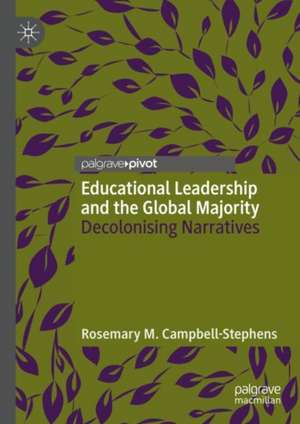Educational Leadership and the Global Majority: Decolonising Narratives
Autor Rosemary M. Campbell-Stephensen Limba Engleză Hardback – 2 dec 2021
Preț: 361.47 lei
Preț vechi: 435.51 lei
-17% Nou
Puncte Express: 542
Preț estimativ în valută:
69.17€ • 72.22$ • 57.24£
69.17€ • 72.22$ • 57.24£
Carte disponibilă
Livrare economică 14-28 martie
Livrare express 28 februarie-06 martie pentru 26.41 lei
Preluare comenzi: 021 569.72.76
Specificații
ISBN-13: 9783030882815
ISBN-10: 3030882810
Pagini: 118
Ilustrații: XII, 121 p.
Dimensiuni: 148 x 210 x 18 mm
Greutate: 0.33 kg
Ediția:1st ed. 2021
Editura: Springer International Publishing
Colecția Palgrave Macmillan
Locul publicării:Cham, Switzerland
ISBN-10: 3030882810
Pagini: 118
Ilustrații: XII, 121 p.
Dimensiuni: 148 x 210 x 18 mm
Greutate: 0.33 kg
Ediția:1st ed. 2021
Editura: Springer International Publishing
Colecția Palgrave Macmillan
Locul publicării:Cham, Switzerland
Cuprins
Chapter 1. Introduction: The Process of Racialisation.- Chapter 2. Language and Power.- Chapter 3. Global Majority: Conceptualising.- Chapter 4. From Minority to Majority.- Chapter 5. A Global Majority Model for Leadership in Urban Contexts.- Chapter 6. Conclusion: Global Majority a Possibility to Live Into.
Notă biografică
Rosemary M. Campbell-Stephens is Visiting Fellow at the Institute of Education, University College London, UK, and Associate in the Centre for Educational Leadership and Decoloniality at Leeds Beckett University, UK.
Textul de pe ultima copertă
“This book will definitely add to ongoing discussions of global responsibility and the role of leadership in these times of a global reckoning on race, anti-Black racism, and White supremacist logics."
—George J. Sefa Dei, Professor of Social Justice Education and Director of Centre for Integrative Anti-Racism Studies, Ontario Institute for Studies in Education (OISE) at the University of Toronto, Canada
“This powerful book has arrived at a critical time. Government policy propagates a vanilla meritocracy which is wilfully colour-blind and in denial of the struggles of Global Majority professionals at every level. Rosemary Campbell-Stephens’ book launches into this territory with authenticity, clarity of analysis based on her experience, and intellectual rigour. Having first coined the term Global Majority almost twenty years ago, she argues why its usage is much deeper than mere symbolism: it represents a shift from tolerating ‘a minority’ to understanding that white hegemony is a post-colonial manifestation that must be challenged in the same way that the history of those who made their fortunes in the slave trade is now being deconstructed.”
—Colin Diamond, Professor of Educational Leadership, University of Birmingham, UK
This book introduces a term for our times, ‘Global Majority,’ as conceptualised within the context of school leadership. It examines the processes and impact over time of racially-minoritising up to eighty-five percent of the world’s population. The chapters illustrate how a decolonised cognitive reset from a minority to majority orientation moves practice from a place of subordination to one of agency and efficacy. By reconnecting the people of the Global Majority with their narratives and the social and historical linkages that they have always had, the book potentially contributes to a different globality; where interdependence is not driven by the economic greed of the minority, but the social and very human needs of the majority.
—George J. Sefa Dei, Professor of Social Justice Education and Director of Centre for Integrative Anti-Racism Studies, Ontario Institute for Studies in Education (OISE) at the University of Toronto, Canada
“This powerful book has arrived at a critical time. Government policy propagates a vanilla meritocracy which is wilfully colour-blind and in denial of the struggles of Global Majority professionals at every level. Rosemary Campbell-Stephens’ book launches into this territory with authenticity, clarity of analysis based on her experience, and intellectual rigour. Having first coined the term Global Majority almost twenty years ago, she argues why its usage is much deeper than mere symbolism: it represents a shift from tolerating ‘a minority’ to understanding that white hegemony is a post-colonial manifestation that must be challenged in the same way that the history of those who made their fortunes in the slave trade is now being deconstructed.”
—Colin Diamond, Professor of Educational Leadership, University of Birmingham, UK
This book introduces a term for our times, ‘Global Majority,’ as conceptualised within the context of school leadership. It examines the processes and impact over time of racially-minoritising up to eighty-five percent of the world’s population. The chapters illustrate how a decolonised cognitive reset from a minority to majority orientation moves practice from a place of subordination to one of agency and efficacy. By reconnecting the people of the Global Majority with their narratives and the social and historical linkages that they have always had, the book potentially contributes to a different globality; where interdependence is not driven by the economic greed of the minority, but the social and very human needs of the majority.
Rosemary M. Campbell-Stephens is Visiting Fellow at the Institute of Education, University College London, UK, and Associate in the Centre for Educational Leadership and Decoloniality at Leeds Beckett University, UK.
Caracteristici
Challenges the minority status attributed to Black and other marginalised groups Interrogates the concept of a "Global Majority," within the existing literature on race and leadership Analyzes the example of a leadership development programme in London schools
